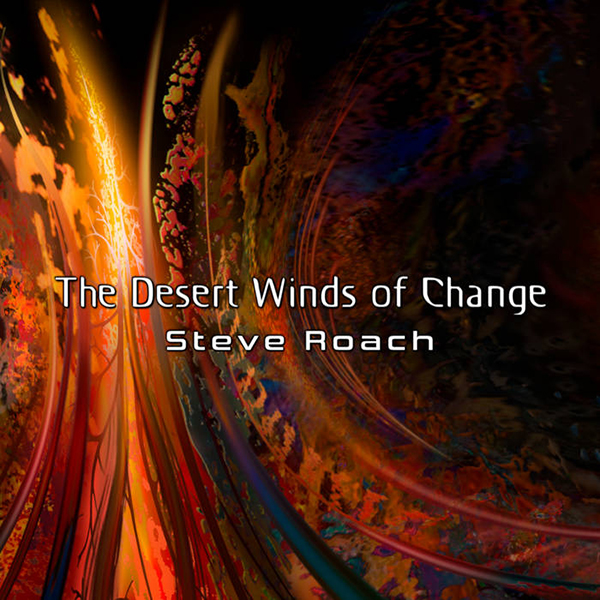Steve Roach's Sequencer Manifesto-The Desert WInds of Change: Echoes February CD of the Month
By John Diliberto
 The most consequential music in your life is probably something that was linked to an experience. And when you hear that music, you remember that experience, even if was fairly mundane. In my case, it was driving the Pennsylvania Turnpike in a snow storm with The Desert Winds of Change at full volume as I was enveloped in snow and laced by weaving melodies. Steve Roach’s The Desert Winds of Change, in an ironically un-desert like situation, propelled me into space.
The most consequential music in your life is probably something that was linked to an experience. And when you hear that music, you remember that experience, even if was fairly mundane. In my case, it was driving the Pennsylvania Turnpike in a snow storm with The Desert Winds of Change at full volume as I was enveloped in snow and laced by weaving melodies. Steve Roach’s The Desert Winds of Change, in an ironically un-desert like situation, propelled me into space.
The Desert Winds of Change is one of Roach’s most compelling nonstop journeys to date. It’s a 51:13 trip that carries you into a new world of evolving, interlaced sequencer patterns that spiral in fractal delirium. This is not the slow, gently undulating drift of Structures from Silence, which celebrates it’s 40th anniversary this year.
The Desert Winds of Change is also an homage to Steve’s biggest influence, Klaus Schulze, especially his 1975 album, Timewind. Steve Roach has transcended that inspiration time and time again, so that even when he returns to that spirit, it emerges in a new, timeless and wholly original form.
 This is another step in Steve Roach’s evolution. It harkens back to his 1980s analog sequencer work, but it really began with his 2015 album, Skeleton Keys, also an Echoes CD of the Month. That album was pure analog modular synth and you can hear that sound in the gestation of the first movement. But now Roach is adding other synthesizers into the mix. It gives this music a richer, less austere sound, in which you can feel the mind of a master musician at work. As synthesist Michael Stearns told me, “He’s taken his sequencing to a level that Tangerine Dream just never got to.”
This is another step in Steve Roach’s evolution. It harkens back to his 1980s analog sequencer work, but it really began with his 2015 album, Skeleton Keys, also an Echoes CD of the Month. That album was pure analog modular synth and you can hear that sound in the gestation of the first movement. But now Roach is adding other synthesizers into the mix. It gives this music a richer, less austere sound, in which you can feel the mind of a master musician at work. As synthesist Michael Stearns told me, “He’s taken his sequencing to a level that Tangerine Dream just never got to.”
That is not faint praise, and you can understand why, when your mind gets wrapped into The Desert Winds of Change.
The album begins in a space of mysterious, liquid abstractions, as if you’re a baby drifting in amniotic fluid. Abstract sounds phase in and out, never quite settling in a groove, a melody or even a pattern. It could be an endless drift if it kept going, but it doesn’t. A couple of minutes into the second movement, sequencers drift in, giving dimension and form to space, and we’re off on a propulsive ride. Multiple sequencer designs lock in, rotating in a synchronized mesh that drives you deeper and deeper into their sound.
On “Desert Winds Part Three,” string-like synths sound like an orchestra wafting in from a distant galaxy while bass ostinatos drift in and out. It is simply mesmerizing the way patterns morph, sometimes moving through different timbres, sometimes slowly changing into newer patterns. But there is nothing slow about this album. Don’t expect a Roach drone zone wash. These are synthesizers in full throttle, like a Formula 1 race, but on a four-dimensional race track. Toward the end of part three, it seems like the piece is going to fade out, but no, recorded live in one take, Roach is just taking a breath, and letting us take a breath, before the sequencer magic of “Part 4” kicks in.
And does it kick in. Out of the sequencers fading into the distance, a bass thud on delay emerges and sequencer cycles appear, gathering around it like electronic bees swarming around a sentient hive in perfectly synchronized motion. It’s symphonic in its dimensions, but no conventional orchestra could play it.
Part 5 continues the momentum, adding in more orchestral-like elements and electronic cymbals return from “Part 2”. Instead of the slow fade-out drone that characterizes most Steve Roach long-form works, (and they are all pretty much long-form), Roach throttles down, stripping patterns away and leaving you with a gentle warp out into the stars. You are left breathless, after a kaleidoscopic rollercoaster ride. But like a rollercoaster ride: you want to jump on again.
The End

If I sign up for a one month CD of the month plan is this how I can get this CD?
There is no “One-Month” CD of the Month plan. If that’s the only disc you want, just buy it.